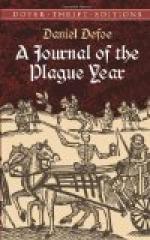On the other hand, when the plague at first seized a family, that is to say, when any one body of the family had gone out, and unwarily or otherwise catched[102] the distemper and brought it home, it was certainly known by the family before it was known to the officers, who, as you will see by the order, were appointed to examine into the circumstances of all sick persons, when they heard of their being sick.
In this interval, between their being taken sick and the examiners coming, the master of the house had leisure and liberty to remove himself, or all his family, if he knew whither to go; and many did so. But the great disaster was, that many did thus after they were really infected themselves, and so carried the disease into the houses of those who were so hospitable as to receive them; which, it must be confessed, was very cruel and ungrateful.
I am speaking now of people made desperate by the apprehensions of their being shut up, and their breaking out by stratagem or force, either before or after they were shut up, whose misery was not lessened when they were out, but sadly increased. On the other hand, many who thus got away had retreats to go to, and other houses, where they locked themselves up, and kept hid till the plague was over; and many families, foreseeing the approach of the distemper, laid up stores of provisions sufficient for their whole families, and shut themselves up, and that so entirely, that they were neither seen or heard of till the infection was quite ceased, and then came abroad sound and well. I might recollect several such as these, and give you the particulars of their management; for doubtless it was the most effectual secure step that could be taken for such whose circumstances would not admit them to remove, or who had not retreats abroad proper for the case; for, in being thus shut up, they were as if they had been a hundred miles off. Nor do I remember that any one of those families miscarried.[103] Among these, several Dutch merchants were particularly remarkable, who kept their houses like little garrisons besieged, suffering none to go in or out, or come near them; particularly one in a court in Throckmorton Street, whose house looked into Drapers’ Garden.
But I come back to the case of families infected, and shut up by the magistrates. The misery of those families is not to be expressed; and it was generally in such houses that we heard the most dismal shrieks and outcries of the poor people, terrified, and even frightened to death, by the sight of the condition of their dearest relations, and by the terror of being imprisoned as they were.




